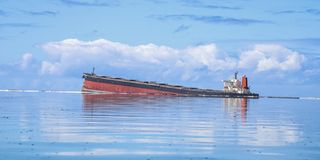France deploys teams to Mauritius as oil spill disaster worsens

This general view taken on August 7, 2020, shows the vessel MV Wakashio, belonging to a Japanese company but Panamanian-flagged, that ran aground near Blue Bay Marine Park off the coast of south-east Mauritius.
What you need to know:
Attempts to stabilise the bulk carrier and pump 4,000 tonnes of fuel from the hold have failed, prompting Prime Minister Pravind Jugnauth to declare "a state of environmental emergency" as oil seeped unabated from a crack in the hull.
Port Louis. France on Saturday dispatched a naval vessel and military aircraft from Reunion to Mauritius, where desperate efforts are underway to contain an oil spill polluting the archipelago's iconic reefs and protected ecosystems.
Rough seas have thwarted efforts to stop fuel leaking from the cargo vessel MV Wakashio, which ran aground two weeks ago and is staining pristine waters in an ecologically-protected marine area off the southeast coast.
Attempts to stabilise the bulk carrier and pump 4,000 tonnes of fuel from the hold have failed, prompting Prime Minister Pravind Jugnauth to declare "a state of environmental emergency" as oil seeped unabated from a crack in the hull.
Volunteers have marshalled along the shores where dark pools of oil now coat the coral reefs, lagoons and white-sand beaches upon which Mauritius has built its reputation as a green tourism destination.
Jugnauth asked France for urgent assistance to mitigate what Mauritian authorities are calling an unprecedented environmental disaster beyond the scope of the tiny Indian Ocean nation.
President Emmanuel Macron on Saturday said expert teams and specialised equipment were being deployed from nearby Reunion, a French island in the Indian Ocean, to assist with the crisis.
"When biodiversity is at risk, there is an urgent need for action. France is there. At the side of the Mauritian people," Macron posted on Twitter.
The French navy ship Le Champlain sailed for Mauritius on Saturday while a military aircraft was scheduled to make two rotations over the spill site, both equipped with specialist pollution control equipment and experts aboard.
The tanker, belonging to a Japanese company but Panamanian-flagged, was carrying 3,800 tonnes of fuel and 200 tonnes of diesel when it struck a reef at Pointe d'Esny, an ecological jewel famed for internationally-listed conservation sites, turquoise waters and protected wetlands.
The environment ministry announced this week that oil had begun seeping from the hull, confirming the worst.
Aerial images show the enormous scale of the damage, with huge stretches of azure seas around the marooned ship stained a deep inky black.
- 'We will never recover' -
Volunteers hastily constructed floating cordons from straw and empty bottles to try and contain the drifting slick, but soon once-idyllic beaches and sensitive mangrove ecosystems were befouled with thick sludge.
"All the volunteers are covered black," Sunil Dowarkasing, a former Greenpeace strategist and environmental expert assisting in the clean-up, told AFP from Mahebourg, one of the worst affected areas.
"We will never be able to recover from this damage. But what we can do is try to mitigate as much as we can."
A spokesman at Mitsui OSK Lines, which operates the vessel owned by another Japanese company, said fuel was being airlifted by helicopter from the grounded vessel to shore but poor weather was complicating matters.
"We tried to place a containment boom near the ship but it’s not working well due to high waves," the spokesman told AFP in Tokyo on Saturday. Some of the fuel was in separate tanks, and may not be at risk of leaking, he added.
Jugnauth has expressed fears the situation could worsen further, with weather forecast to deteriorate over the weekend.
"We do not know what's going to happen to the boat," he said.
But the opposition has called for the resignation of the country's environment and fisheries ministers, with the government being criticised for not acting earlier.
"People are angry," Dowarkasing said.
Ecologists fear the ship could further break up, causing an even greater leak and inflict potentially catastrophic damage on the island nation's coastline, which forms the backbone of the economy.
Mauritius and its 1.3 million inhabitants depend crucially on its seas for food and for ecotourism, boasting some of the finest coral reefs in the world, sanctuaries for rare and endemic wildlife, and unique RAMSAR-listed wetlands.
Twenty crew members were evacuated safely from the ship when it ran aground on July 25.




